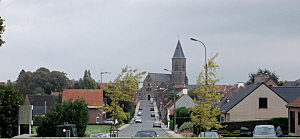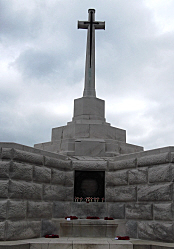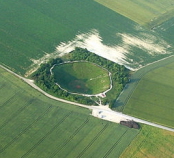Drive
to the start at Reims 3rd & 4th October
Getting
to Reims was an adventure for some in its own right. The Sprite, NSX,
and S2000 crews headed for the Hull Zeebrugge ferry route, whilst the
remainder opted for the Channel Tunnel. It was a sunny Monday morning
when the crews headed off to their UK departure points and the Sprite
crew decided to take the top down. It would never be up again for the
whole trip, some 3100 miles, except when parked at the overnight stops.
While the Hull crews met up and enjoyed a leisurely
crossing, care of P&O ferries, Dave Spence and Roddie were
feverishly running out of options. The big 5 litre Capri was not going
to be ready, once it was discovered that the engine had been sent from
the states with the wrong gearbox. Dave had a plan B which was to buy a
Capri 2.8i special, two of which he had spotted. Days before the off he
purchased one, but it had been laid up for some time and a quick test
run soon blew the head gaskets. Not to worry, the pair quickly changed
them and all looked ok. Heading for the Channel Tunnel they had
travelled just south of Inverness when the water boiled. Ah! Time for
Plan C (how many plans does Dave normally put together?) Back to
Inverness and transfer everything to the good old Sierra.
The
Sierra should know the first part of the route, having been the course
car for the Monte Carlo Glasgow start earlier in the year. Chasing
after the others a misfire started to occur, but not so severe as to
stop the now “concerned” crew. Eventually they
arrived at Ashford to meet up with the Ferrari, Porsche and MX5 crews.
The next morning they signed in and lined up to roll on to the train,
at which point the Sierra spluttered to a halt and would not start
again. Back in the car park the car was towed around the parking bays
to no avail, while the others had to press on with their crossing.
Eventually the problem was traced to a dead petrol pump which had been
the problem all along. A repair and return to the train was met with
some confusion. The computer said they had left for France so could not
be here, and what “computer says” must be right.
After a lot of “discussion” with the authorities
the computer was abandoned and they were allowed on to the next train.
 Meantime
the Hull to Zeebrugge crews had landed and were making their way across
country to Reims, by way of the Western Front. First port of call was
Passchendaele, destroyed during the 1914 - 1918 war and rebuilt just as
it had been. We visited the British cemetery, just outside the town,
before stopping for a coffee in the town square. It was difficult to
imagine the carnage on this spot nearly 100 years ago when everything
including the church was flattened and the place a complete mud bath. A
visit to the Canadian Monument outside the town was followed by a trip
to Tyne Cot a few kilometres down the road. Meantime
the Hull to Zeebrugge crews had landed and were making their way across
country to Reims, by way of the Western Front. First port of call was
Passchendaele, destroyed during the 1914 - 1918 war and rebuilt just as
it had been. We visited the British cemetery, just outside the town,
before stopping for a coffee in the town square. It was difficult to
imagine the carnage on this spot nearly 100 years ago when everything
including the church was flattened and the place a complete mud bath. A
visit to the Canadian Monument outside the town was followed by a trip
to Tyne Cot a few kilometres down the road.
 The
name "Tyne Cot" is said to come from the Northumberland Fusiliers
seeing a resemblance between the German concrete pill boxes, which
still stand in the middle of the cemetery, and typical Tyneside
workers' cottages - Tyne Cots. Walking to the visitor centre before
entering the cemetery, we became aware of a female voice speaking.
Every 5 seconds or so a name and age would be announced. This continued
in the centre with a photo of a fallen soldier. We were there over an
hour and it never seemed to repeat. The cemetery is vast, and while
there were many visitors the place was immaculate, with gardeners
constantly tending the grass and flowers. What impressed me most were
the school parties who left Remembrance crosses with messages on the
central monument. I, and I think the school parties found the
experience deeply moving and hopefully they have seen the futility of
war. The
name "Tyne Cot" is said to come from the Northumberland Fusiliers
seeing a resemblance between the German concrete pill boxes, which
still stand in the middle of the cemetery, and typical Tyneside
workers' cottages - Tyne Cots. Walking to the visitor centre before
entering the cemetery, we became aware of a female voice speaking.
Every 5 seconds or so a name and age would be announced. This continued
in the centre with a photo of a fallen soldier. We were there over an
hour and it never seemed to repeat. The cemetery is vast, and while
there were many visitors the place was immaculate, with gardeners
constantly tending the grass and flowers. What impressed me most were
the school parties who left Remembrance crosses with messages on the
central monument. I, and I think the school parties found the
experience deeply moving and hopefully they have seen the futility of
war.
On our way to the next stop on our itinerary
the Sprite crew, who knew the locations, lost the others in the rush
hour traffic in Arras. Reverse engineering a Tom Tom location to a map,
in France, where road numbers change seemingly daily, proved too much
and we decided to meet up in Reims.
The Sprite crew
then visited, and walked the trenches at the Newfoundland Memorial
Park, a site on the Somme battlefield near to Beaumont Hamel. The land
was bought by the Canadian government after the First World War. It was
named after the Royal Newfoundland Regiment, which had provided one
battalion of 800 men who were decimated during one of the battles
serving with the British and Commonwealth Armies.
From
there we drove to the Thiepval Monument, a memorial to the Missing of
the Somme battlefields, and bears the names of 72,194 officers and men
of the United Kingdom and South African forces.
 Finally
we climbed up to the Lochnagar Crater in La Boisselle. A vast and
impressive crater in open farm-land, which was left by a tremendous
explosion in the opening moments of the Battle of the Somme on 1 July
1916. Photographs do not do it justice. It is like a lunar crater, so
big that on approach it is impossible to see the bottom until you are
right on the crater edge. Finally
we climbed up to the Lochnagar Crater in La Boisselle. A vast and
impressive crater in open farm-land, which was left by a tremendous
explosion in the opening moments of the Battle of the Somme on 1 July
1916. Photographs do not do it justice. It is like a lunar crater, so
big that on approach it is impossible to see the bottom until you are
right on the crater edge.
The experience of our
visits was very humbling and a tear was in my eye on more than one
occasion as we walked over the very ground that brave men and women
fought over during the Great War. Not much was said in the car on the
final run into Reims that afternoon.
By 2100hrs on
the 4th of October we had a table for 14 people filled in the Ibis at
Reims. Were the challenges so far an omen of things to come? We kept
our fingers crossed. | Seven
crews joined the Alpina 2011 for thirteen days of “col bashing” in
the European Alps.
The tour would see us climb some 18 cols in all, the
Turini four times. A total of 39600 metres, that is nearly 120000 feet
in old money.
As in the 2009 event all the crews made their way to the
start venue at Reims, in fact to the same Ibis hotel in Tinqueux. The
trip had been planned around Ibis hotels in the belief this would give
us a good standard of accommodation and the fallback of a restaurant in
the hotel of an evening. This latter belief would be shattered on more
than one occasion.
Newcomers were Charlie and Susan
Donaldson who brought along their Mazda MX5.
Graeme and Beth Cargill
were to have arrived in a VW Golf, but sadly that was having problems
so the Honda NSX appeared, looking fantastic.
Ron Adam and Duncan
Massie should have been in Ron’s MGB/GT, but last minute
disasters following an engine rebuild meant using Ron’s
wife’s Honda S2000.
Returning from the
2009 event was Joe Norman in his 1983 Porsche 911 Turbo, this time with
Terry Clark sharing the driving and reading the maps.
Donald and
Margaret Campbell in their 1989 Ferrari 358 also returned, though
Margaret left both her knitting (See Crofterra 2010 video) and sewing
behind. She would however be kept busy mapping each days route.
Jim
Paterson joined up with Tom Dromgoole in the Austin Healey Sprite, now
an old hand at finding its way to the top of mountain passes.
Dave
Spence and Roddie Main returned in what we thought would be a Ford
Capri fitted with an American 5 litre V8 (Dave likes his engines Big!),
but that would also change. |